加doing的短语有
- 格式:doc
- 大小:20.00 KB
- 文档页数:2
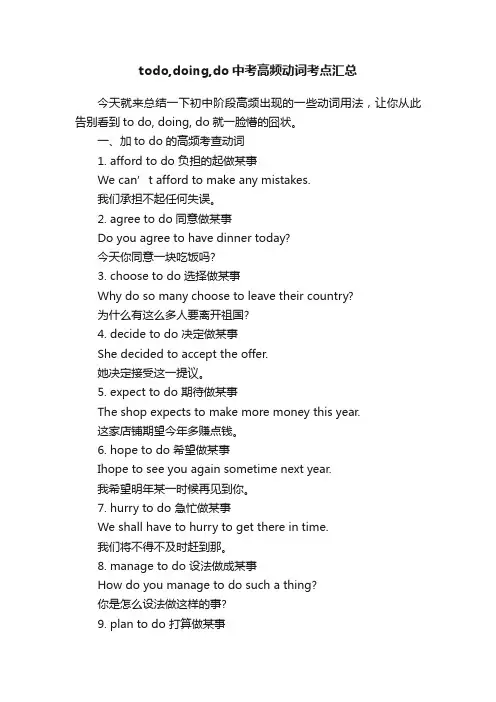
todo,doing,do中考高频动词考点汇总今天就来总结一下初中阶段高频出现的一些动词用法,让你从此告别看到to do, doing, do就一脸懵的囧状。
一、加to do的高频考查动词1. afford to do 负担的起做某事We can’t afford to make any mistakes.我们承担不起任何失误。
2. agree to do同意做某事Do you agree to have dinner today?今天你同意一块吃饭吗?3. choose to do 选择做某事Why do so many choose to leave their country?为什么有这么多人要离开祖国?4. decide to do 决定做某事She decided to accept the offer.她决定接受这一提议。
5. expect to do 期待做某事The shop expects to make more money this year.这家店铺期望今年多赚点钱。
6. hope to do 希望做某事Ihope to see you again sometime next year.我希望明年某一时候再见到你。
7. hurry to do 急忙做某事We shall have to hurry to get there in time.我们将不得不及时赶到那。
8. manage to do 设法做成某事How do you manage to do such a thing?你是怎么设法做这样的事?9. plan to do 打算做某事Where do you plan to spend your holiday?你打算去哪里度假?10. prefer to do 宁愿做某事Iprefer to travel in the front of the car.我宁愿坐在汽车的前面。
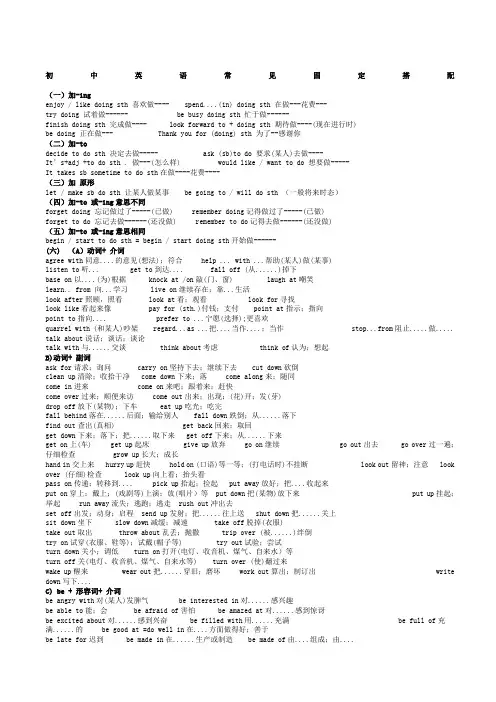
初中英语常见固定搭配(一)加-ingenjoy / like doing sth 喜欢做---- spend....(in) doing sth 在做---花费---try doing 试着做------ be busy doing sth 忙于做------finish doing sth 完成做---- look forward to + doing sth 期待做----(现在进行时)be doing 正在做--- Thank you for (doing) sth 为了--感谢你(二)加-todecide to do sth 决定去做----- ask (sb)to do 要求(某人)去做----It’s+adj +to do sth . 做---(怎么样) would like / want to do 想要做-----It takes sb sometime to do sth在做----花费----(三)加原形let / make sb do sth 让某人做某事 be going to / will do sth (一般将来时态)(四)加-to 或-ing意思不同forget doing 忘记做过了-----(已做) remember doing记得做过了-----(已做)forget to do 忘记去做------(还没做) remember to do记得去做------(还没做)(五)加-to 或-ing意思相同begin / start to do sth = begin / start doing sth开始做------(六) (A)动词+ 介词agree with同意....的意见(想法);符合 help ... with ...帮助(某人)做(某事)listen to听... get to到达.... fall off (从......)掉下base on以....(为)根据 knock at /on敲(门、窗) laugh at嘲笑learn.. from 向...学习 live on继续存在;靠...生活look after照顾,照看 look at看;观看 look for寻找look like看起来像 pay for (sth.)付钱;支付 point at指示;指向point to指向.... prefer to ...宁愿(选择);更喜欢quarrel with (和某人)吵架 regard...as ...把....当作....;当作 stop...from阻止.....做..... talk about说话;谈话;谈论talk with与......交谈 think about考虑 think of认为;想起B)动词+ 副词ask for请求;询问 carry on坚持下去;继续下去 cut down砍倒clean up清除;收拾干净 come down下来;落 come along来;随同come in进来 come on来吧;跟着来;赶快come over过来;顺便来访 come out出来;出现;(花)开;发(芽)drop off放下(某物);下车 eat up吃光;吃完fall behind落在......后面;输给别人 fall down跌倒;从......落下find out查出(真相) get back回来;取回get down下来;落下;把......取下来 get off下来;从......下来get on上(车) get up起床 give up放弃 go on继续 go out出去 go over过一遍;仔细检查 grow up长大;成长hand in交上来 hurry up赶快 hold on (口语)等一等;(打电话时)不挂断 look out留神;注意 look over (仔细)检查 look up向上看;抬头看pass on传递;转移到.... pick up拾起;捡起 put away放好;把....收起来put on穿上;戴上;(戏剧等)上演;放(唱片)等 put down把(某物)放下来 put up挂起;举起 run away流失;逃跑;逃走 rush out冲出去set off出发;动身;启程 send up发射;把......往上送 shut down把......关上sit down坐下 slow down减缓;减速 take off脱掉(衣服)take out取出 throw about乱丢;抛撒 trip over (被......)绊倒try on试穿(衣服、鞋等);试戴(帽子等) try out试验;尝试turn down关小;调低 turn on打开(电灯、收音机、煤气、自来水)等turn off关(电灯、收音机、煤气、自来水等) turn over (使)翻过来wake up醒来 wear out把......穿旧;磨坏 work out算出;制订出 write down写下....C) be + 形容词+ 介词be angry with对(某人)发脾气 be interested in对......感兴趣be able to能;会 be afraid of害怕 be amazed at对......感到惊讶be excited about对......感到兴奋 be filled with用......充满 be full of充满......的 be good at =do well in在....方面做得好;善于be late for迟到 be made in在......生产或制造 be made of由....组成;由....be pleased with对......感到满意 be proud of以......自豪/高兴 be used for用于D)动词+ 名词/ 代词beg one′s pardon请原谅;对不起 do morning exercises做早操do one′s homework做作业 enjoy oneself =have a good time过得快乐;玩得愉快 give a concert开音乐会 go boating去划船 go fishing去钓鱼go hiking去徒步旅行 go skating去滑冰 go shopping (去)买东西have a cold (患)感冒 have a cough (患)咳嗽 have a headache (患)头痛have a try尝试;努力 have a look看一看 have a rest休息have a seat (= take a seat ) 就坐;坐下 have sports进行体育活动have supper吃晚餐 hear of听说 hold a sports meeting举行运动会make a decision作出决定 make a mistake犯错误 make a noise吵闹make faces做鬼脸 make friends交朋友 make money赚钱take one′s place坐某人的座位;代替某人的职务teach oneself (=learn by oneself ) 自学 watch TV看电视 take photos照相 take time花费(时间) take turns轮流E)动词+ 名词/ 代词/ 副词+ 介词catch up with赶上 come up with找到;提出(答案、解决办法等)get on well with与......相处融洽 give birth to生(孩子)help yourself / yourselves to自取;随便吃 make room for给.....腾出地方play a joke on戏弄人;对人恶作剧 speak highly of称赞say good bye to告别;告辞 take an active part in积极参加take care of照顾;照料;注意F)其他类型be awake醒着的 be born出生 be busy doing忙着做come true实现 do one′s best尽最大努力 fall asleep睡觉;入睡go home回家 go on doing (sth.)继续做某事;尽力 get married结婚get together相聚 go straight along 沿着...一直往前走 had better (do)最好(做...) keep doing sth.一直做某事 make sure确保;确认;查明make up one′s mind下决心初中英语语法大全(固定搭配)1 (see 、hear 、notice 、find 、feel 、listen to 、 look at 感官动词)+do eg:I like watching monkeys jump2 (比较级 and 比较级)表示越来越怎么样3 a piece of cake =easy 小菜一碟(容易)4 agree with sb 赞成某人5 all kinds of 各种各样 a kind of 一样6 all over the world = the whole world 整个世界7 along with同…一道,伴随…eg : I will go along with you我将和你一起去The students planted trees along with their teachers.学生同老师们一起种树8 as soon as 一怎么样就怎么样 9 as you can see 你是知道的10 ask for ……求助向…要…(直接接想要的东西) eg : ask you for my book11 ask sb for sth 向某人要什么12 ask sb to do sth 询问某人某事 ask sb not to do 叫某人不要做某事13 at the age of 在……岁时 eg:I am sixteen. =I am at the age of sixteen.14 at the beginning of …………的起初;……的开始15 at the end of +地点/+时间最后;尽头;末尾 eg : At the end of the day.16 at this time of year 在每年的这个时候17 be /feel confident of sth /that clause +从句感觉/对什么有信心,自信eg : I am / feel confident of my spoken English.I feel that I can pass the test.18. be + doing 表:1 现在进行时 2 将来时I am watching now. I am going to the zoo tomorrow.19 be able to (+ v 原) = can (+ v 原)能够……eg : She is able to sing She can sing20 be able to do sth 能够干什么 eg :She is able to sing.21 be afraid to do /of sth 恐惧,害怕……eg : I'm afraid to go out at night. I'm afraid of dog.22 be allowed to do 被允许做什么eg: I'm allowed to watch TV.我被允许看电视。
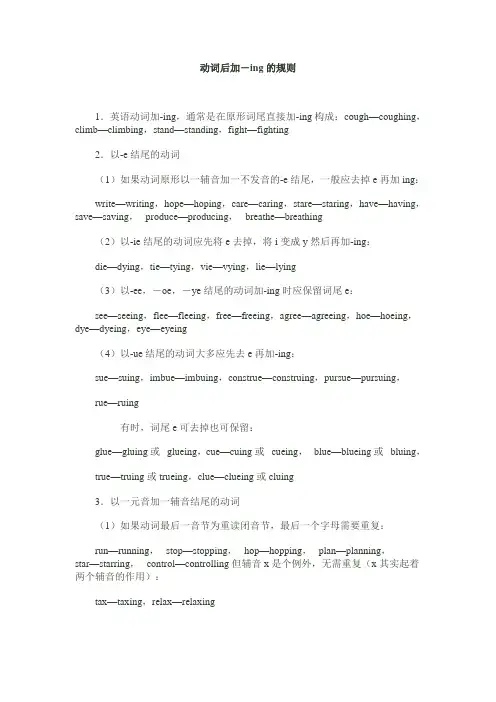
动词后加-ing的规则1.英语动词加-ing,通常是在原形词尾直接加-ing构成:cough—coughing,climb—climbing,stand—standing,fight—fighting2.以-e结尾的动词(1)如果动词原形以一辅音加一不发音的-e结尾,一般应去掉e再加ing:write—writing,hope—hoping,care—caring,stare—staring,have—having,save—saving,produce—producing,breathe—breathing(2)以-ie结尾的动词应先将e去掉,将i变成y然后再加-ing:die—dying,tie—tying,vie—vying,lie—lying(3)以-ee,-oe,-ye结尾的动词加-ing时应保留词尾e:see—seeing,flee—fleeing,free—freeing,agree—agreeing,hoe—hoeing,dye—dyeing,eye—eyeing(4)以-ue结尾的动词大多应先去e再加-ing:sue—suing,imbue—imbuing,construe—construing,pursue—pursuing,rue—ruing有时,词尾e可去掉也可保留:glue—gluing或glueing,cue—cuing或cueing,blue—blueing或bluing,true—truing或trueing,clue—clueing或cluing3.以一元音加一辅音结尾的动词(1)如果动词最后一音节为重读闭音节,最后一个字母需要重复:run—running,stop—stopping,hop—hopping,plan—planning,star—starring,control—controlling但辅音x是个例外,无需重复(x其实起着两个辅音的作用):tax—taxing,relax—relaxing(2)如果动词最后一个音节为次重读音节,最后一个字母有时也重复:kidnap—kidnapping或kidnaping,program—programming或programing(3)如果动词最后一个音节为非重读音节,最后一个字母大多无需重复:open—opening,offer—offering,audit—auditing但在有些动词中,重复或不重复均可:worship—worshiping或worshipping,focus—focusing或focussing,cancel—canceling或cancelling,travel—traveling或travelling以非重读的-el结尾的动词加-ing时,英国英语习惯于重复词尾l,而美国英语则习惯于不重复1。
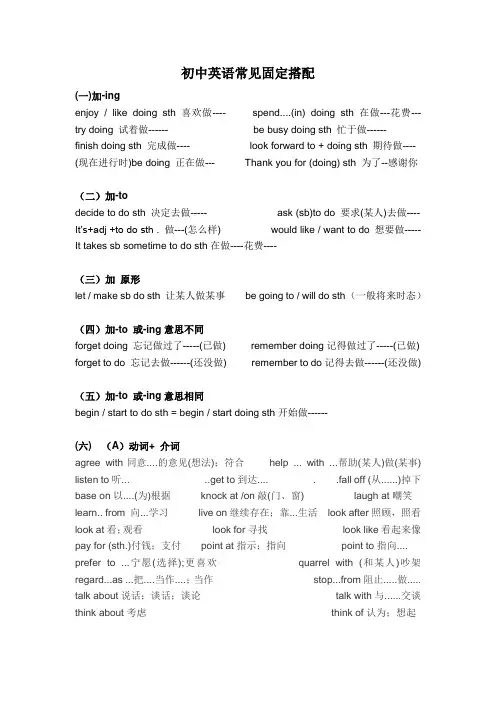
初中英语常见固定搭配(一)加-ingenjoy / like doing sth 喜欢做---- spend....(in) doing sth 在做---花费--- try doing 试着做------ be busy doing sth 忙于做------finish doing sth 完成做---- look forward to + doing sth 期待做---- (现在进行时)be doing 正在做--- Thank you for (doing) sth 为了--感谢你(二)加-todecide to do sth 决定去做----- ask (sb)to do 要求(某人)去做---- It’s+adj +to do sth . 做---(怎么样) would like / want to do 想要做----- It takes sb sometime to do sth在做----花费----(三)加原形let / make sb do sth 让某人做某事be going to / will do sth (一般将来时态)(四)加-to 或-ing意思不同forget doing 忘记做过了-----(已做) remember doing记得做过了-----(已做) forget to do 忘记去做------(还没做) remember to do记得去做------(还没做)(五)加-to 或-ing意思相同begin / start to do sth = begin / start doing sth开始做------(六) (A)动词+ 介词agree with同意....的意见(想法);符合help ... with ...帮助(某人)做(某事) listen to听... ..get to到达.... . .fall off (从......)掉下base on以....(为)根据knock at /on敲(门、窗) laugh at嘲笑learn.. from 向...学习live on继续存在;靠...生活look after照顾,照看look at看;观看look for寻找look like看起来像pay for (sth.)付钱;支付point at指示;指向point to指向.... prefer to ...宁愿(选择);更喜欢quarrel with (和某人)吵架regard...as ...把....当作....;当作stop...from阻止.....做..... talk about说话;谈话;谈论talk with与......交谈think about考虑think of认为;想起B)动词+ 副词ask for请求;询问carry on坚持下去;继续下去cut down砍倒clean up清除;收拾干净come down下来;落come along来;随同come in进来come on来吧;跟着来;赶快come over过来;顺便来访come out出来;出现;(花)开;发(芽) drop off放下(某物);下车eat up吃光;吃完fall behind落在......后面;输给别人fall down跌倒;从......落下find out查出(真相) get back回来;取回get down下来;落下;把......取下来get off下来;从......下来get on上(车) get up起床give up放弃go on继续go out出去go over过一遍;仔细检查grow up长大;成长hand in交上来hurry up赶快hold on (口语)等一等;(打电话时)不挂断look out留神;注意look over (仔细)检查look up向上看;抬头看pass on传递;转移到....pick up拾起;捡起put away放好;把....收起来put on穿上;戴上;(戏剧等)上演;放(唱片等put down把(某物)放下来put up掛起;举起run away流失;逃跑;逃走rush out冲出去set off出发;动身;启程send up发射;把......往上送shut down把......关上sit down坐下slow down减缓;减速take off脱掉(衣服) take out取出throw about乱丢;抛撒trip over (被......)绊倒try on试穿(衣服、鞋等);试戴(帽子等) try out试验;尝试turn down关小;调低turn on打开(电灯、收音机、煤气、自来水等turn off关(电灯、收音机、煤气、自来水等) turn over (使)翻过来wake up醒来wear out把......穿旧;磨坏work out算出;制订出write down写下....C) be + 形容词+ 介词be angry with对(某人)发脾气be interested in对......感兴趣be able to能;会be afraid of害怕be amazed at对......感到惊讶be excited about对......感到兴奋be filled with用......充满be full of充满......的be good at =do well in在....方面做得好;善于be late for迟到be made in在......生产或制造be made of由....组成;由....be pleased with对......感到满意be proud of以......自豪/高兴be used for用于D)动词+ 名词/ 代词beg one´s pardon请原谅;对不起do morning exercises做早操do one´s homework做作业enjoy oneself =have a good time过得快乐;玩得愉快give a concert开音乐会go boating去划船go fishing去钓鱼go hiking去徒步旅行go skating去滑冰go shopping (去)买东西have a cold (患)感冒have a cough (患)咳嗽have a headache (患)头痛have a try尝试;努力have a look看一看have a rest休息have a seat (= take a seat ) 就坐;坐下have sports进行体育活动have supper吃晚餐hear of听说hold a sports meeting举行运动会make a decision作出决定make a mistake犯错误make a noise吵闹make faces做鬼脸make friends交朋友make money赚钱take one´s place坐某人的座位;代替某人的职务teach oneself (=learn by oneself ) 自学watch TV看电视take photos照相take time花费(时间)take turns轮流E)动词+ 名词/ 代词/ 副词+ 介词catch up with赶上come up with找到;提出(答案、解决办法等) get on well with与......相处融洽give birth to生(孩子) help yourself / yourselves to自取;随便吃make room for给.....腾出地方play a joke on戏弄人;对人恶作剧speak highly of称赞say good bye to告别;告辞take an active part in积极参加take care of照顾;照料;注意F)其他类型be awake醒着的be born出生be busy doing忙着做come true实现do one´s best尽最大努力fall asleep睡觉;入睡go home回家go on doing (sth.)继续做某事;尽力get married结婚get together相聚go straight along沿着...一直往前走had better (do)最好(做...) keep doing sth.一直做某事make sure确保;确认;查明make up one´s mind下决心初中固定搭配的句式1. in one’s +序数词+year+ 某学校在某校。
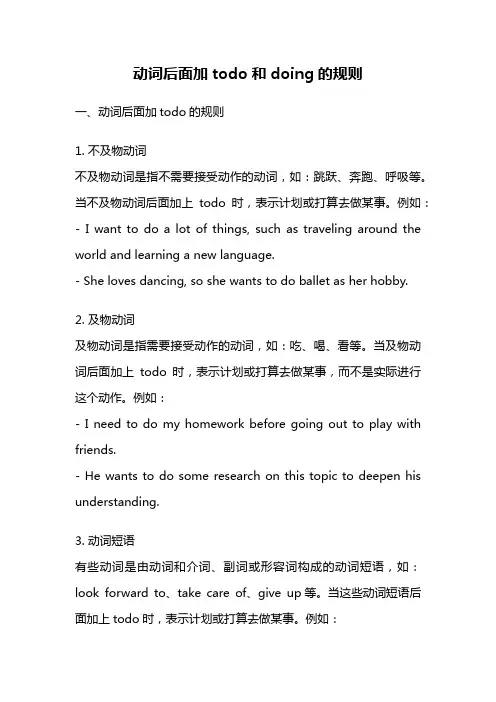
动词后面加todo和doing的规则一、动词后面加todo的规则1. 不及物动词不及物动词是指不需要接受动作的动词,如:跳跃、奔跑、呼吸等。
当不及物动词后面加上todo时,表示计划或打算去做某事。
例如:- I want to do a lot of things, such as traveling around the world and learning a new language.- She loves dancing, so she wants to do ballet as her hobby.2. 及物动词及物动词是指需要接受动作的动词,如:吃、喝、看等。
当及物动词后面加上todo时,表示计划或打算去做某事,而不是实际进行这个动作。
例如:- I need to do my homework before going out to play with friends.- He wants to do some research on this topic to deepen his understanding.3. 动词短语有些动词是由动词和介词、副词或形容词构成的动词短语,如:look forward to、take care of、give up等。
当这些动词短语后面加上todo时,表示计划或打算去做某事。
例如:- She is looking forward to doing some shopping during the holiday.- They should take care of their health by doing exercise regularly.二、动词后面加doing的规则1. 不及物动词不及物动词后面加上doing表示正在进行某个动作。
例如:- She is swimming in the pool now.- They are playing basketball in the park.2. 及物动词及物动词后面加上doing表示正在进行某个动作,并且这个动作有对象。
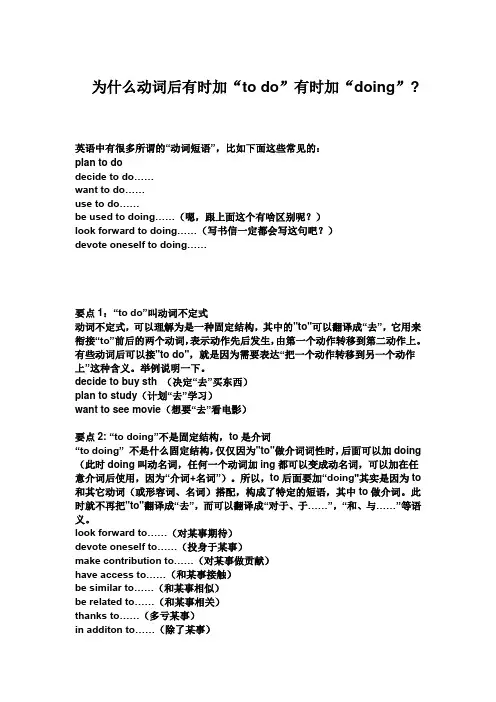
为什么动词后有时加“to do”有时加“doing”?英语中有很多所谓的“动词短语”,比如下面这些常见的:plan to dodecide to do……want to do……use to do……be used to doing……(嗯,跟上面这个有啥区别呢?)look forward to doing……(写书信一定都会写这句吧?)devote oneself to doing……要点1:“to do”叫动词不定式动词不定式,可以理解为是一种固定结构,其中的"to"可以翻译成“去”,它用来衔接“to”前后的两个动词,表示动作先后发生,由第一个动作转移到第二动作上。
有些动词后可以接"to do",就是因为需要表达“把一个动作转移到另一个动作上”这种含义。
举例说明一下。
decide to buy sth (决定“去”买东西)plan to study(计划“去”学习)want to see movie(想要“去”看电影)要点2: “to doing”不是固定结构,to是介词“to doing” 不是什么固定结构,仅仅因为"to"做介词词性时,后面可以加doing (此时doing叫动名词,任何一个动词加ing都可以变成动名词,可以加在任意介词后使用,因为“介词+名词”)。
所以,to后面要加“doing"其实是因为to 和其它动词(或形容词、名词)搭配,构成了特定的短语,其中to做介词。
此时就不再把"to"翻译成“去”,而可以翻译成“对于、于……”,“和、与……”等语义。
look forward to……(对某事期待)devote oneself to……(投身于某事)make contribution to……(对某事做贡献)have access to……(和某事接触)be similar to……(和某事相似)be related to……(和某事相关)thanks to……(多亏某事)in additon to……(除了某事)以上动词短语、名词短语、形容词短语中的to”全部都是介词,这些短语后面都要加名词(注意,我特地翻译成“某事”,就是想强调后面加名词),所以一旦碰到动词,后面就只能接“doing ”,把动词变名词,才不会出现语法错误。
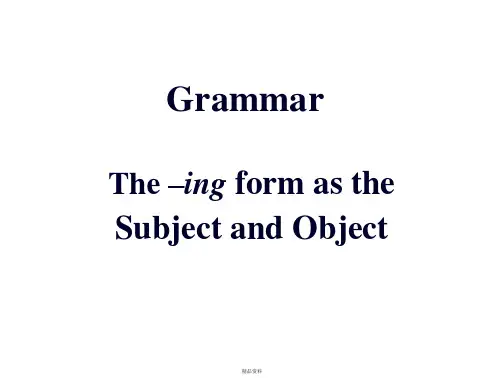
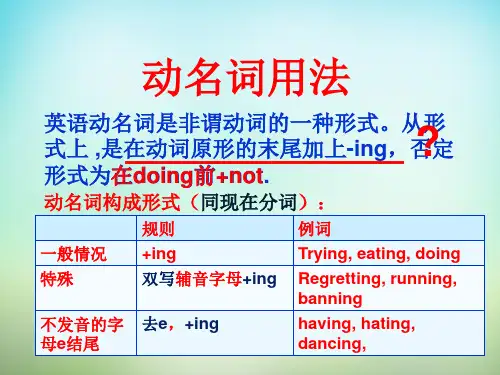

英语固定结构搭配一)固定结构:1.allow doing (区别:allow sb. to do sth .)2.keep doing3.keep /carry on doing4.keep sb. doing5.enjoy doing (He enjoys nothing but playing the computer.)6.finish doing7.be afraid of doing8.be worth doing (This piece of music is worth listening to.)9.be busy doing (They are busy getting ready for the New Year’s Eve.)10.be/get/become used to doing (We are used to living in the countryside.)11.dislike doing (She dislikes doing housework.)12.how about doing//what about doing13.spend some time (in)doing14.spend some money (in) buying15.feel like doing16.stop/keep/prevent … from doing17.thank you for doing18.thanks for doing19.do some cooking/cleaning/reading/shopping/wash ing20.goswimming/fishing/shopping/skating/boati ng21.mind doing22.prefer doing … to doing…23.practise (practice) doing (He practices speaking English every day.)24.can’t help doing25.have fun/difficulty/trouble/problem doing sth.26.waste time/money doing27.instead of doing28.miss doing29.look forward to doing期望(渴望)做某事(I'm looking forward to getting your letter.)30.thank…for doing31.leave sb./sth.doing (His parents leave his staying at home on weekend.)二)need,require,want译作“需要”时,跟动词-ing作宾语,主动表示被动,相当于to be done,如:1.The windows require cleaning.(The windows require to be cleaned.)2.The patient needs operating on at once.(The patient needs to be operated on.)3.The flowers want watering.(The flowers want to be watered.)三)动词-ing在句中作表语:Our plan is setting up a new car factory. My job is teaching/driving.这类词作表语,起解释说明主语的作用,主表可颠倒:Teaching is my job.转换成问句,用what提问:——What's your job?——My job is teaching.四)动词-ing作定语:表示被修饰名词的用途:There are two reading rooms in ourschool library.a reading room其含义是A room is used for reading.The swimming pool in our school is nearly completed.the swimming pool其含义是The pool is used for swimming.五)下面短语中的to是介词,后面只能跟名词或动名词:get down to(着手干……),lead to (通向,导致),object to(反对),pay attention to (注意),look forward to (盼望),be used to (习惯于),stick to (坚持),prefer …to …等.〔误〕His whole family objected to his give up the job.〔正〕His whole family objected to his giving up the job.只能是doing sthenjoy doing sth享受做某事finish doings sth[]结束做某事practice doing sth[]练习做某事mind doing sth []介意某事be busy doing sth []忙于做某事have fun doing sth []很开心做某事have problems doing sth []有问题做某事have difficulties doing sth []有困难做某事have trouble doing sth[]有麻烦做某事 1 spend some time doing sth []花时间做某事 prefer doing sth to doing sth []更喜欢做某事be used to doing sth []习惯于做某事look forward to doing sth []盼望做某事 be interested in doing sth []有兴趣做某事by doing sth 通过做某事只能是to do sth15、 want to do sth []想要16、 would like to do []愿意17、 agree to do []同意18、 refuse to do []拒绝19、 decide to do []决定20、 plan to do[]计划21、 expect to do[]期望22、 hope to do[]希望23、 wish to do[]但愿to do doing 均可,但意思不一样24、 like to do sth[]喜欢马上去做某事25、 like doing sth []平常喜欢做某事26、 prefer to do sth []更喜欢马上去做某事27、 prefer doing sth []平常更喜欢做某事28、 hate to do []不喜欢马上去做某事29、 hate doing sth[]平常不喜欢做某事30、 try to do sth []尽力去做某事31、 try doing sth []试着去做某事32、 remember to do sth []记得去做某事33、 remember doing sth []记得做过某事34、 forget to do sth []忘记去做某事35、 forget doing sth []忘记做过某事36、 stop to do sth []停下来去做某事37、 stop doing sth []停下正做的事V+sb+to do sth结构38、 would like sb to do sth[]愿意某人去做某事39、 like sb to do sth[]喜欢某人去做某事40、 want sb to do sth []想要某人去做某事41、 wish sb to do sth []但愿某人去做某事42、 expect sb to do sth []期盼某人去做某事43、 prefer sb to do sth []更喜欢某人去做某事44、 allow sb to do sth []同意某人去做某事45、 encourage sb to do sth []鼓励某人去做某事46、 advise sb to do sth []建议某人去做某事47、 ask sb to do sth []要求某人去做某事48、 tell sb to do sth []告诉某人去做某事49、 get sb to do sth[]使得某人去做某事50、 invite sb to do sth []邀请某人去做某事特殊结构51、 make sb do sth[]让某人去做某事52、 let sb do sth[]让某人去做某事53、 have sb do sth[]让某人去做某事54、 help sb to do sth[]帮助某人去做某事55、 help sb do sth[]帮助某人去做某事其他结构56、 stop sb from doing sth[]阻止某人去做某事57、 stop sb doing sth[]阻止某人去做某事58、 keep sb doing sth[]让某人一直做某事59、 keep sb from doing sth[]阻止某人去做某事60、 get sth done[]让某事被做61、 have it repaired[]让这个东西被修理62、 have my ears pierced[]让我的耳朵穿孔63、 have my hair cut[]让我的头发被剪64、 health healthy healthily[]健康n 健康的adj 健康地adv65、 weight himself[]自已量体重66、 daily walk[]每天的散步67、 monthly meeting[]每月的会议68、 clever bright wise[]聪明的adj 聪胆伶俐的adj 见多识广的adj69、 must be[]一定是70、 at least[]至少n75、 ask for permission[]请求同意the best route[]最好的路线80、 crowded awful[]拥挤的adj 糟糕的adj 83、 make it worse[]使之更差动词加-ing 的情况consider, suggest/advise,look forward to, exc use/pardonadmit,delay/put off,fancyavoid,miss,keep/keep on,practisedeny,finish,enjoy/appreciateforbid,imagine,riskcan't help,mind,allow/permit,escape二动词后加doing 和加to do sth. 意思不一样的情况①remember doing指记住过去做过的事,remember to do指记住将来要做的事,表示“不要忘记”。
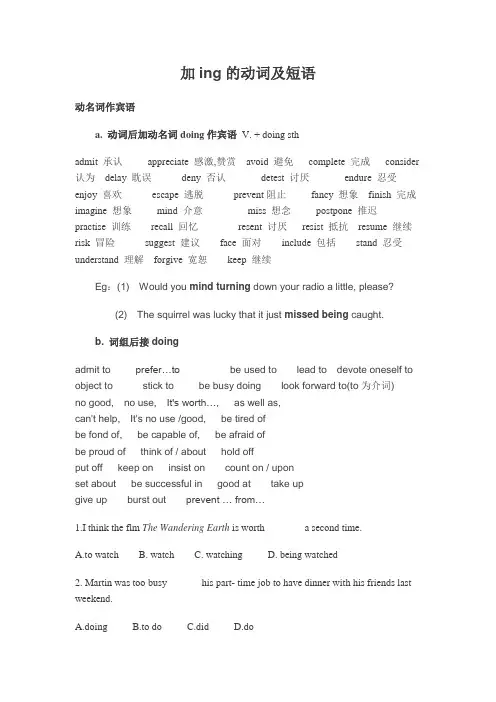
加ing的动词及短语动名词作宾语a. 动词后加动名词doing作宾语V. + doing sthadmit 承认appreciate 感激,赞赏avoid 避免complete 完成consider 认为delay 耽误deny 否认detest 讨厌endure 忍受enjoy 喜欢escape 逃脱prevent阻止fancy 想象finish 完成imagine 想象mind 介意miss 想念postpone 推迟practise 训练recall 回忆resent 讨厌resist 抵抗resume 继续risk 冒险suggest 建议face 面对include 包括stand 忍受understand 理解forgive 宽恕keep 继续Eg:(1)Would you mind turning down your radio a little, please?(2)The squirrel was lucky that it just missed being caught.b. 词组后接doingadmit to prefer…to be used to lead to devote oneself to object to stick to be busy doing look forward to(to为介词)no good,no use,It's worth…,as well as,can't help,It's no use /good,be tired ofbe fond of,be capable of,be afraid ofbe proud of think of / about hold offput off keep on insist on count on / uponset about be successful in good at take upgive up burst out prevent … from…1.I think the flm The Wandering Earth is worth _______ a second time.A.to watchB. watchC. watchingD. being watched2. Martin was too busy ______ his part- time job to have dinner with his friends last weekend.A.doingB.to doC.didD.do3. The parents made the little boy ______ the piano for one and a half hours.A. practice playingB.to practice playingC.practice to playD.to practice to play4.--Have you read the book Jane Eyre?--Yes.It's a famous book and really worth ______.A.to readB.readingC.to be read5. Because of the horrible tsunami(海啸), the Indonesia government warned all the tourists ______ indoors to keep safe.A.to stayB.not stayC.stayingD.not staying6.Life is like a story. ______ your story wonderful, you'd better improve yourself all the time.A.MakeB.To makeC.MakingD. Made7. Yesterday my mother was busy _______ for her driving test.A.learnedB. learnsC. learnD.learning8. My parents encouraged me _______ my heart, so they agreed with my decisions.A.followB.followingC. to followD.followed9.Dan shows an interest in musical instruments and is ofen heard _____ the guitar.A.playB.playedC. playingD.to play10.He prefers ______ to ________.A.sing; danceB.to sing; to danceC. singing; dancingD.sings; dances11.I'm trying to sleep. Would you mind ______ the music?A.turn downB. turning downC.to tur downD.to turning downst weekend Peter went to the library ______ some books on music.A.borrowB. borrowedC.to borrowD.borrowing13.I will spend as much time as I can _____ English during this summer holiday.A. practice speakingB.to practice speakingC. practicing speakingD.practicing speak14.-Look at these dirty clothes.-Sorry, dear. I can't help _____ these clothes because I have to go to work today.A.to washB. washingC.to be washedD. washed15.--We're too busy _____ anything useful to help improve the environment.--Don't worry! Some daily actions can help a lot.A.doingB.to doC. done答案:1-5:CAABA 6-10:BDCDC 11-15:BCCAB。
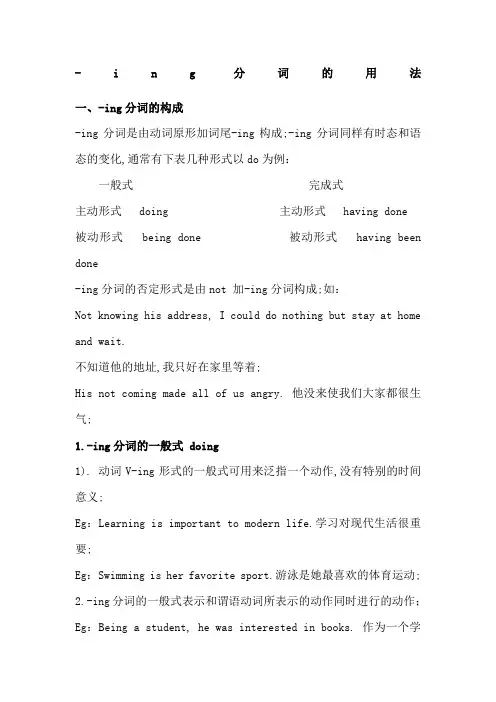
-i n g分词的用法一、-ing分词的构成-ing分词是由动词原形加词尾-ing构成;-ing分词同样有时态和语态的变化,通常有下表几种形式以do为例:一般式完成式主动形式 doing 主动形式 having done被动形式 being done 被动形式 having been done-ing分词的否定形式是由not 加-ing分词构成;如:Not knowing his address, I could do nothing but stay at home and wait.不知道他的地址,我只好在家里等着;His not coming made all of us angry. 他没来使我们大家都很生气;1.-ing分词的一般式 doing1). 动词V-ing形式的一般式可用来泛指一个动作,没有特别的时间意义;Eg:Learning is important to modern life.学习对现代生活很重要;Eg:Swimming is her favorite sport.游泳是她最喜欢的体育运动;2.-ing分词的一般式表示和谓语动词所表示的动作同时进行的动作;Eg:Being a student, he was interested in books. 作为一个学生,他对书本很感兴趣;Eg:They went out of the classroom, talking and laughing. 他们有说有笑地走出教室;2.-ing分词完成式 having done:完成式表示动作在谓语动词所表示的动作之前发生的动作;Eg:Not having studied his lessons very hard, he failed the examinations. 因为没有努力学习功课,他考试不及格;Eg:Having answered the letter, she went on to read an English novel.Eg:Having lived in this city for three years, she knows it very well.3. -ing分词的被动式 being done :-ing分词的被动式表示它的逻辑主语是-ing分词动作的承受者;被动语态-ing一般式所表示的动作是一个正在进行中的被动动作. Eg:The question being discussed is very important. 正在被讨论的问题很重要;4. having done的被动形式having been done表示它的逻辑主语是动词-ing形式表示的动作的承受者;表示动作在谓语表示的动作之前发生;Eg:Having been criticized by the teacher, he gave up smoking. 被老师批评以后,他把烟戒了;Eg:Having been shown the lab, we were taken to see the schoollibrary.在被带去看了实验室之后,我们又被带去参观校图书馆;5动词-ing形式的否定形式;动词-ing形式的否定形式通常是在其前加not,带有逻辑主语时not 应放在动词-ing形式之前;Eg:Excuse me for my not coming on time.Eg:I’m sorry for not having kept my promise.例1. ______ to the station on time made everyone wor ried last week.A. Him not gettingB. Not his gettingC. His not gettingD. Not getting6.动词-ing形式的复合结构动词ing形式的复合结构由形容词性物主代词或人称代词宾格,名词所有格或普通格加动名词,动名词的复合结构实际上是给动名词加了一个逻辑主语; 动词-ing形式的复合结构有四种形式:①形容词性物主代词+动名词②名词‘s +动名词③代词宾格+动名词④名词+动名词注意动名词的复合结构可在句中作主语或宾语;作主语时,不能用③④两种形式;Eg:Tom’s winning the first prize last year impressed me a lot. 汤姆去年得了一等奖使我印象深刻;Eg:Do you mind my/me/Jack’s/Jack leaving now.翻译练习:His coming made us very happy. 他的到来使我们大家都很高;翻译练习:He was awakened by someone’s knocking at the door. 他被某人的敲门声吵醒了;二 -ing分词的语法作用动词-ing一方面具有动词的性质,另一方面也相当于一个名词或形容词、副词,在句中可以作主语、表语、宾语、定语、状语和补语等; 1–ing分词短语作主语: 动词ing形式作主语往往表示经常性、习惯性的动作,谓语动词用单数:Eg:Reading books widens our knowledge.读书增长我们的知识Eg:Saying is easier than doing. 说比做容易;翻译练习:Learning English well is not easy.在下面两种结构中,-ing分词也作主语;A.It is no use/no good/useless/worthwhile/dangerous/a wa ste of time /fun等后需用动名词作真正的主语;为了保持句子平衡,通常用it 作形式主语,而把真实主语放在句末;Eg:It is no use crying over spilt milk. 覆水难收Eg:It's a waste of time arguing about it. 辩论这事是浪费时间;翻译练习:It is no use waiting for him any longer.B.当句型“There is no doing…”表示“不允许、禁止某种行为的发生或存在”时,需用动名词作主语;Eg:There is no joking about such matters. 这种事开不得玩笑;There is no point indoing sth 干…….没意义; Eg:There’s no point in waiting. 等待是毫无意义的; There is no senseindoing sth. 干…没道理/意义例.1.In my mind,_____ that famous university will be the only way to become a worlds-class writer. A. attending B.to attend C. attendD. having attended2. My grandfather is a millionaire, but _____ money does not solve all his problem.A. hasB. to haveC. havingD. having had2 -ing分词短语作表语:Eg:His hobby is collecting stamps. 他的爱好是收集邮票; Eg:The problem is quite puzzling. 这个问题很令人困惑;3 -ing分词作宾语:①–ing分词可作动词宾语, 作动词的宾语;mind介意, suggest建议, enjoy欣赏,, admit承认, appreciate 感激,欣赏, avoid避免, delay推迟, dislike不喜欢,厌恶, escape 逃脱, finish完成, forgive宽恕, imagine想象, keep保持, miss 错过, practise训练, resist抵抗,抵制, risk冒险, deny拒绝,否认, consider考虑等;Eg:I suggest doing it in a different way. 我建议用另一种方法做这件事;Eg:We enjoy attending Miss Li''s class. 我们喜欢听李老师的课;例1:He got well-prepared for the job interview, for he couldn’t risk _____ the good opportunity.A. to loseB. losingC. to be lostD. being lost答案B.后risk 后接动名词,he与 lose是主谓关系;2:Bill suggested _____ a meeting on what to do for the Shanghai Expo during the vacation.A. having heldB. to holdC. holdingD. hold3.To improve your spoken English, you should practic e_____ it every day. A. speak B. to be spo ken C. speaking D. to speak②-ing分词作宾补,也可用在复合宾语中作真正的宾语,而用it作形式宾语;如:Eg:I don’t think it possible living in such a cold place. 我认为住在这么寒冷的地方是不可能的;Eg:Do you consider it any good trying again 你觉得再试一次会有好处吗③-ing分词作介词宾语,经常用在一些短语的后面;如:Eg:I'm against inviting him to dinner. 我反对邀请他来吃饭; Eg:They don’t feel like walking that much. 他们不喜欢走那么多路;翻译练习:Don’t be afraid of speaking English.不要害怕说英语;此类短语还有很多;如:can’t help忍不住be proud of以……自豪, be responsible for对……负责, insist on坚持, keep on 继续think of考虑,想到, dream of梦想, hear of听说, prevent…from防止,阻止, keep…from防止,阻止, stop…from防止,阻止, be engaged in从事于, depend on依靠,依赖, thank…for因……而道谢, excuse…for因……而道歉, aim at目的在于, set about着手做, be fond of喜欢, be afraid of害怕, be tired of对……厌烦, succeed in成功地做……, be interested in对……感兴趣, be ashamed of对……感到羞愧, put off推迟, give up放弃, be worth值得做……, be busy in doing sth 忙于做某事 ,等等;注意:在有些句子中,介词常可省去;如:Eg:I have no difficulty in communicating with foreigners. 我在和外国人交谈方面没有什么困难;Eg:What can prevent us from getting married 有什么能阻止我们结婚翻译练习: Farmers were busy in getting in the crops. 农民在忙着收庄稼;翻译练习: I have never dreamed of visiting that place. 我从未梦想过要参观那个地方翻译练习: He used to spend a lot of time in playing games. 过去他常花很多时间玩游戏;例1.The girl said that she had never dream of _____a volunteer.A. beB. to beC. beingD. is2. I had great difficulty _____ the suitable food on the menu in that restaurant.A. findB. foundC. to findD. finding3. Seeing the funny scene, I can’t help______.A. laughB. to laughC. laughingD. laughed另外,-ing分词可以和一些介词如in, on, after, against, before, by, for, without, besides等构成短语,在句中作状语;如:Eg:He left ahead of time without saying a word. 他一句话也没说就提前离开了;Eg:Besides cooking and sewing, she had to take care of four children.除了做饭和缝纫以外,她还要照顾四个孩子;Eg:On hearing the news, all the pupils jumped with joy. 一听到这个消息后,所有的学生都高兴得跳了起来;4 -ing分词作定语:①单个的分词作定语一般放在被修饰词的前面,–ing分词作定语可用来说明被修饰的名词的用途和性能;如:reading material 阅读材料 walking stick 手杖 fishing pole 鱼杆flying suit 飞行服 writing table 写字台 listening practice 听力训练reading room 阅览室 swimming pool 游泳池 dining car 餐车sleeping car 卧车 singing competition 歌咏比赛 waiting room 候车室②-ing分词作定语还可以表示所修饰的人或物的动作或状态,在意思上接近一个定语从句,可以表示正在进行的动作,也可表示经常性动作或当时的状态;如:developing countries = countries that are developing 发展中国家a growing city = a city that is growing 发展着的城市Eg:Who is the student standing by the door 站在门边的同学是谁Eg:They lived in a house facing south.=They lived in a house which faces south. 他们住在一所朝南的房子里;翻译练习:坐在我旁边的女孩是我妹妹;The girl sitting beside me is my sister.翻译练习:有人在敲门There is someone knocking at the door.③–ing分词还可以作非限制性定语,相当于一个非限制性定语从句,常用逗号和句子其它部分分开;如:Eg:When she appeared, John, wearing a dirty and worn-out overcoat, ran to her with joy. 当她出现的时候,约翰穿着一件又脏又破的大衣高兴地跑了过去;5 -ing分词做状语:动词-ing形式作状语可以修饰谓语动词或整个句子,可以表示时间、原因、结果、条件、让步、方式或伴随情况等;①.表示时间:-ing分词短语作时间状语,相当于一个时间状语从句,有时可由连词when, while引出;Eg:Turning around, she saw a car driving up.=When she turned around, she saw a car driving up. 她转过身,看见一辆车朝她开来;Eg:While reading the book, he nodded from time to time. 他一边看书,一边不时地点头;翻译练习:看到那些画,他想起了她的童年;Seeing those pictures, she remembered her childhood.翻译练习: 听到这消息时我们高兴地跳了起来;Hearing the news, we jumped with joy.②表示原因:-ing分词短语作原因状语,相当于一个原因状语从句;Eg:Being tired, he could not walk any further.=As he wastired, he could not walk any further. 因为疲倦,他不能再往前走了;Eg:Not knowing his address, I can’t send this book to him. 因为不知道他的地址,我不能把这本书送给他;Eg:Many of us, being so excited, couldn’t go to sleep that night. 因为非常激动,那晚我们许多人都没睡着;翻译练习:因为不知道路,他无法到那里去;Not knowing the way, he could’t go there.翻译练习:因为激动他睡不着;Being excited , she couldn’t go to sleep.③表示结果:–ing分词短语作结果状语;表示一种必然的结果,可扩展为一个含有并列谓语的简单句;The fire lasted nearly a month, leaving nothing v aluable.=The fire lasted nearly a month, and left nothing valuable. 大火持续了近一个月,几乎没剩下什么值钱的东西; Eg:His father died, leaving him a lot of money. 他父亲死了,留给他许多钱;Eg:She was so angry that she threw the toy on the ground, breaking it into pieces.她非常生气,把玩具扔在地上,把它摔成了碎片;④表示伴随.-ing分词作伴随状语,可以放在句子的前面、后面或中间,表示主语的另一个、较次要的动作;如:Eg:I stood by the door, not daring to say a word.=I stood by the door, and did not dare to say a word. 我站在门旁,不敢说一句话;Eg:They stood there for half an hour,watching the stars in the sky. 他们在那儿站了半小时,观察着天上的星星;翻译练习:年轻人跟在老人的后面开始慢慢地走起来;Following the old man, the young people started walking slowly. 翻译练习:他们在那儿站了一个小时观看比赛;They stood there for an hour watching the game.⑤表示条件:动词-ing形式作条件状语,相当于一个条件状语从句;Being more careful, you can make fewer mistakes.=If you are more careful, you can make fewer mis takes. 更细心点,你就会少犯错误;Turning to the left, you ‘ll see the tower.向左转,你就会看到那座塔;翻译练习:如果努力,你就会成功;Working hard, you will succeed.⑥“with/without+名词普通格或代词宾格+-ing分词”结构在句中作状语,表示伴随情况或时间、原因等;如:Eg:His hair became gray with the years passing. 随着时间的推移,他的头发变花白了;Eg:Without anyone noticing, he slipped through the window. 没人注意,他从窗户溜了出去;例1.The storm left, ______ a lot of damage to this area.A. causedB. to have causedC. to causedD. having caused例2.----“You can’t catch me” Janet shouted, ______ away.A. runB. runningC. to runD. ran 例3.It’s necessary to be prepared for a job interview. ______ the answers ready will be of great help.A. To have hadB. Having hadC. HaveD. Having 例 4._____ from other continents for millions of years, Australia has many plants and animals not found in any other country in the world.A. Being separatedB. Having separatedC. Having been separatedD. To be separated例5.Daddy didn’t mind what we were doing, as long as we were together, _____ fun.A. hadB. haveC. to haveD. having 例6.Oil prices have risen by 32 percent since the start of the year, _____ a record $57.65 a barrel on April 4.A. have reachedB. reachingC. to reachD. to be reaching例7.It was unbelievable that the fans waited outside the gym for three hours just _____ a look at the sports stars.A. hadB. havingC. to haveD. have例8._____ more about university course, call 9207463789. A. To find out B. Finding out C. Find out D. Having found out简析:1.D.结果状语,时间有明显先后之分;2.B.伴随状语;3.D.条件状语,有明显时间先后之分;4.C.原因状语,时间有明显先后之分;5.D.伴随状语;6.B.结果状语;7.C.作目的状语;8.A.作目的状语;6 -ing分词作补语:--ing分词可以在see, hear, notice, watch, feel, look at, listen to, observe, have, get, leave, keep, set, catch, find等动词后面和一个名词或代词构成一个复合宾语,作宾语补语;如:Eg:I noticed a man running out of the bank when I got off the car.我下车的时候注意到一个男人匆匆忙忙地从银行里跑出来;Eg:Last night the shopkeeper caught a child stealing some food in the shop.昨晚,店主在商店里抓到一个小孩在偷东西;翻译练习:I saw him going upstairs.我看见他正在上楼;翻译练习:We watched her crossing the street. 我们看着她穿过大街;三. –ing分词作主语和表语时与不定式的区别:1、-ing分词和动词不定式作主语和表语的主要区别在于:在表示比较抽象的一般的多次性行为时多用-ing分词;在表示具体的或一次性的动作,特别是将来的动作时,多用不定式;如:Eg:Smoking is forbidden here. 泛指吸烟这里禁止吸烟;Eg:It’s not good for you to smoke so much. 指你吸烟吸这么多烟对你的身体不好;2、有些动词既能接不定式,又能接-ing分词,含义有所不同;如:Remember doing sth 记得做了某事Remember to do sth 记住要去做某事Forget doing sth 忘记做了某事Forget to do sth 忘记要去做某事Regret doing sth 后悔做了某事Regret to do sth 遗憾要去做某事Mean to do sth 打算做某事Mean doing sth意味着做某事Stop to do sth 停下来去做某事Stop doing sth 停止做某事Try to do sth 努力/企图做某事Try doing sth 试着做某事Eg:Do you remember seeing me before 你记得以前见过我吗Eg:Remember to lock the door when you leave. 离开时要记得锁门;Eg:I try not to think about that. 我尽量不去想那件事;Eg:Would you please try doing that again 请你再试一次好吗Eg:I mean to change it for another one. 我想换成另外一个; 翻译练习:Having finished the exercises, we went on to learn the new words in the next unit.做完练习以后,我们继续学习下一单元的单词;翻译练习:After a short rest, they went on working. 短暂地休息以后,他们又继续工作;翻译练习:Missing the train means waiting for another hour. 错过这班车就意味着再等一个小时;例 1. Never mind. Please try _____ the problem in another way.A. solveB. to solveC. being solvedD. solving例2. When asked by the police, he said that he remembered _____ at the party, but not _______.A. to arrive, leavingB. to arrive, to leaveC. arriving, leavingD. arriving, to leave答案 C.记得来过晚会,用arriving,但是后的动作仍然记得,用leaving.3、动词allow, advise, forbid, permit等可直接跟-ing分词作宾语,不可以接动词不定式作宾语,但可接不定式作宾语补语;如:Eg:We don’t permit smoking here. 我们这儿不允许吸烟;Eg:Please permit me to say a few words. 请允许我说几句话; 例1.---Can I smoke here----Sorry. We don’t allow_____ here.A. people smokingB. people smokeC. to s mokeD. smoking4、动词need, require, want作“需要”解时以及deserve作“值得”解时,后面接-ing分词或不定式的被动式;need / want/require/deserve doing=need/want/require/dese rve to be done Eg:The lake needs repairing/ to be repairedEg:These little children require looking after carefully/to be looked after carefully. 这些小孩需要细心地照料;翻译练习:Your shoes need cleaning/ to be cleaned. 你的鞋需要清洗一下了;翻译练习:The room wants cleaning/to be cleaned. 这个房间需要打扫;例:As a result of the serious flood, two-third of the buildings in the area______.A. need repairingB. needs to repairC. needs repairingD. need to repair5、动词like, hate, prefer等后面,如表示一般性动作,多用-ing 分词;如指特定的具体的某次动作,多用不定式;如:Eg:I like swimming, but I don’t like to swim with you. 我喜欢游泳,但我不喜欢和你一起游泳;Eg:I prefer walking to school every day. 我情愿每天步行去学校;Eg:I prefer to stay at home today. 今天我情愿呆在家里;6、-ing分词作表语的两种不同含义:①-ing分词作表语可以表示主语的内容是什么;Eg:Their job is building houses. 他们的工作是盖房子;Eg:The real question is getting to know the needs of the people. 真正的问题是了解人民的需要;②-ing分词作表语还可以表示主语所具有的特征;如:Eg:This story is very interesting. 这故事很有趣;Eg:The problem is quite puzzling. 这个问题很令人困惑;7、不定式和-ing分词作宾语补语的区别:在see, hear, feel, watch, notice等感官动词后,既可用-ing分词构成复合宾语,也可用不定式构成复合宾语,两者之间有一定的区别;用-ing分词时,表示动作正在进行;用不定式时,表示动作发生了,即动作的全过程结束了;如:Eg:Do you hear someone knocking at the door Someone isknocking at the door. 有人在敲门你听见了吗Eg:Do you hear someone knock at the door Someone knocked at the door just now. 你听见有人敲门了吗8、高中阶段常见的带介词to的短语,后接-ing分词或名词;如:look forward to渴望,盼望admit to承认, contribute to捐助、贡献, get down to着手做, give way to让位于,keep to 坚持、遵守, lead to 导致, take to从事, turn to 求助于, stick to忠于、坚持, point to指向、表明, see to 注意、处理, be used to 习惯于, devote oneself to 献身于, be equal to 胜任的、等于, be familiar to 为……熟悉be/get used to习惯于 object to反对,抗议pay attention to注意 .9、高中阶段有一些固定的-ing分词短语,如:generally speaking 一般来说, judging from…根据……来判断, considering…考虑到……, talking of…谈到……,提到……, supposing…假如……等,它们的逻辑主语和句子的主语不一致;这种短语可以被称之为句子的状语,也可当作一个插入语;如:Eg:Judging from his accent, he must come from Canada. 从他的口音看他一定来自加拿大;Eg:Considering how poor he was, we decided to let him attend the concert for free.考虑到他是多么的穷,我们决定让他免费听音乐会;Exercises:1. The officers narrowly escaped ___________in the hot battle.A. have killedB. to killC. to be killedD. being killed2.___________ the letter, he went out to post it.A. WritingB. Being writingC. Having writtenD. Written3. Don't you remember ___________A. seeing the man beforeB. to see the man beforeC. saw the man beforeD. to have seen the man before4. People couldn't help ___________ the foolish emperor in the procession.A. laugh atB. to laugh atC. laughing atD. laughing on5. We're looking forward ___________ the photo exhibition.A. to visitingB. to visitC. to having visitedD. visiting6. The girl ___________ under that tree is my sister.A. sittingB. sitsC. is sittingD. sat7. This sentence needs ___________ .A. a improvementB. improveC. improvingD. improved8. ___________ anything about the accident, he went to work as usual..A. Not knownB. Known notC. Knowing notD. Not knowing9. The next morning she found the man ___________ in bed, dead.A. lyingB. lieC. layD. laying10. There was terrible noise ___________ the sudden burst oflight.A. followedB. followingC. to be followedD. being followed11. The secretary worked late into the night, ___________ a long speech for the president.A. to prepareB. preparingC. preparedD. was preparing12. "Can't you read " Mary said ___________ to the notice.A. angrily pointingB. and point angrilyC. angrily pointedD. and angrily pointing13. How about two of us ___________ a walk down the gardenA. to takeB. takeC. takingD. to be taking14. ---I must apologize for ___________ahead of time. ---That's all right.A. letting you not knowB. not letting you knowC. letting you know notD. letting not you know15. ---You were brave enough to raise objections at the meeting. ---Well, now I regret ___________ that.A. to doB. to be doingC. to have doneD. having done16. Would you ___________ me your identification card, sirA. mind to showB. mind showingC. trouble to showD. trouble showing17. He suggested ___________ on Saturday.A. to have a meetingB. having a meetingC. a meeting to haveD. that having a meeting18. It is no good ___________ to come now. He is busy.A. if you ask himB. to ask himC. asking himD. that you ask him19. Although punctual himself, the professor was quite used ___________ late for his lecture.A. to have studentsB. for students to beC. for students' beingD. to students' being20. He dressed himself quickly and ___________ his schoolbag, went to school.A. carriedB. to carryC. carryingD. carries21. ___________ for several weeks, the city needed food.A. As having floodedB. being floodedC. Having been floodedD. To flood22. ___________ ill worried my parents greatly.A. I fellB. Me fallingC. My fallingD. I falling23. She is writing a letter to a friend of hers, ___________ him to attend the meeting.A. having invitedB. invitingC. to inviteD. invited24. Our town has dozens of factories, ___________several saw mills.A. includedB. are includingC. are includedD. including25. ___________ the classroom, the students went to theplayground to watch the football match.A. To cleanB. Having cleanedC. CleanedD. Cleaning语法专项练习二1.北京 ________in the queue for half an hour, Tom suddenlyrealized that he had left his wallet at home.A. To waitB. Have waitedC. Having waitedD. To have waited2.上海 According to a recent U.S. survey, children spent up to25 hours a week ______TV.A. to watchB. to watchC. watchingD. watch3.上海 The flu is believed _______ be viruses that like toreproduce in the cells inside the human nose and throat.A. causingB. being causedC. to be causedD. to have caused4.上海 The flowers ______ sweet in the botanic garden attractthe visitors to the beauty of nature.A. to smellB. smellingC. smeltD. to be smelt5.天津 Don’t leave the water ______ while you brush your teeth.A. runB. runningC.being run D. to run6.重庆 They see you as something of a worrier, ______ problemswhich don’t exist and crossing bridges long before you cometo them.A. settlingB. discoveringC.seeing D. designing7.福建The news reporters hurried to the airport, only ______the film stars had left.A. to tellB. to be toldC.telling D. told8.湖南 You were silly not _____ your car.A. to lockB. to have lockedC. lockingD. having locked9.江苏 The man insisted _______ a taxi for me even though I toldhim I lived nearby.A. findB. to findC. onfinding D. in finding10.江苏 The old man, _______ abroad for twenty years, is on theway back to his motherland.A. to workB. workingC. to haveworked D. having worked1-5 D C A C D6---10 A C D A B 11---15 B A C B D 16---20 B B C D C 21---25 C C B D B 1—10 CCCBB CBBCD。
动词后加to do 和doing 的记忆口诀一、只能用动名词(ing)作宾语[口诀]考虑建议盼原谅,承认推迟没得想。
避免错过继续练,否定完成停欣赏。
禁止想象才冒险,不禁介意弃逃亡。
consider 考虑suggest 建议/advocate 提倡主张look forward to 盼望forgive 原谅/pardon 原谅acknowledge 承认/admit 承认postpone 延迟延期/delay 延迟/defer 拖延recall 回想/fancy 幻想爱好avoid 避免miss 错过keep 保持practise 练习实践deny 否认complete 完成/finish 完成cease 停止/quit 放弃停止appreciate 感激欣赏forbid 禁止/prevent 阻止imagine 设想risk 冒险can’t help 不禁mind 介意escape 逃跑逃避加动名词的动词大集合口诀(原创)故事是以一个家长的口吻讲述:我有时很感激欣赏(appreciate)我的孩子,但总是避免(avoid) 承认(admit)这一点,请允许(allow)我寻求您的建议(advise),{名词为advice}您考虑(consider)后告诉我如何克服这个小缺点。
还有一件事,我的孩子总是拖延(delay)他不喜欢(dislike) 的事,不可否认(deny)这就是逃避(escape)。
老师原谅(excuse)了他,但是告诫他要喜欢(enjoy)自己的该做的事。
我曾经禁止(forbid)他凭空想象(fancy)赶快完成(finish)自己手头的事,他反对我并保持(keep)他的想象(imagine),说介意(mind)自已会错过(miss)任何灵感。
有专家告诉我要允许(allow)孩子去实践(practise),去冒险(risk),因为孩子不能抵制(resist)自己闯的诱惑,只要建议(suggest)他忍受(stand)住任何学习工作的艰苦就可以了。
动词后加【1 】to do 和 doing的记忆口诀一.只能用动名词(ing)作宾语[口诀]斟酌建议盼谅解,承认推迟没得想.防止错过持续练,否定完成停观赏.制止想象才冒险,不由介怀弃流亡.consider斟酌suggest建议/advocate 倡导主意look forward to 愿望forgive谅解/pardon 谅解acknowledge承认/admit 承认postpone延提前期/delay 延迟/defer 迁延recall回忆/fancy 理想快活爱好avoid防止miss错过keep保持practise演习实践deny否定complete完成/finish 完成cease停滞/quit 废弃停滞appreciate感谢观赏forbid制止/prevent 阻拦imagine假想risk冒险can’t help 不由mind介怀escape逃跑回避加动名词的动词大聚集口诀(原创)故事是以一个家长的口气讲述:我有时很感谢观赏(appreciate)我的孩子,但老是防止(avoid)承认(admit)这一点,请许可(allow)我追求您的建议(advise),{名词为advice}您斟酌(consider)后告知我若何战胜这个小缺陷.还有一件事,我的孩子老是迁延(delay)他不爱好(dislike)的事,不成否定(deny)这就是回避(escape).先生谅解(excuse)了他,但是申饬他要爱好(enjoy)本身的该做的事.我曾制止(forbid)他凭幻想象(fancy)赶紧完成(finish)本身手头的事,他否决我并保持(keep)他的想象(imagine),说介怀(mind)自已会错过(miss)任何灵感.有专家告知我要许可(allow)孩子去实践(practise),去冒险(risk),因为孩子不克不及抵制(resist)本身闯的诱惑,只要建议(suggest)他忍耐(stand)住任何进修工作的艰难就可以了.最终孩子必定会懂得(understand)的.1. enjoy doing sth享受做某事2. finish doing sth停滞做某事3. practice doing sth演习做某事4. mind doing sth介怀某事5. be busy doing sth忙于做某事6. have fun doing sth很高兴做某事7. have problems doing sth有问题做某事8. have difficulties doing sth有艰苦做某事9. have trouble doing sth有麻烦做某事10.spend some time doing sth花时光做某事11.prefer doing sth to doing sth更爱好做某事12.be used to doing sth习惯于做某事13.look forward to doing sth愿望做某事14.be interested in doing sth有兴致做某事[口诀](基本词)三个愿望两答应:hope, wish, want, agree, promise两个请求莫谢绝:demand, ask, refuse设法学会做决议:manage, learn, decide不要伪装在选择:pretend, choosehope to do 愿望wish to do 愿望want to do sth想要agree to do 赞成promise to dodemand to do ,ask to do, refuse to do 谢绝manage to ,learn to do ,decide to do, pretend to do 筹划choose to do 期望三.请求跟不定式的动词[口诀](晋升式)愿望想学就赞成:hope/wish, would like/want, learn, agree须要决议选to do:need, decide, choose开端爱好又憎恶:begin/start, like/prefer/love, hate忘却.停滞持续试:forget, remember, stop, go on, try (to do; doing意不合)敕令.警告邀人教:order, warn, ask 请/tell 叫/invite 邀请, teach + sb. to do愿望想让他人做:wish, want/would like, get 使得;答应/allow 许可 + sb. to do五看三使役:see/look/watch/notice/observe, (使役动词)make/let/have 使得;让二听一感半帮忙:hear/listen to, feel, (to) help(即“一感”“二听”“三让”“四看”口诀)自动to 字要离去,自动to字要回府.to do/doing均可,但意思不一样(to do 未完成的将要去做的另一件事,doing已完成or正在做的一向在做的本来的事)like to do sth爱好立时去做某事(未做,将要去做)like doing sth平凡爱好做某事(已做,一向在做的本来的事)prefer to do sth更爱好立时去做某事(未做,将要去做) prefer doing sth平凡更爱好做某事(已做,一向在做的本来的事)hate to do 不爱好立时去做某事(未做,将要去做)hate doing sth平凡不爱好做某事(已做,一向在做的本来的事)try to do sth努力去做某事(未做,将要去做)try doing sth试着去做某事(已做,一向在做的本来的事)remember to do sth记得去做某事(未做,将要去做) remember doing sth记得做过某事(已做,一向在做的本来的事)forget to do sth忘却去做某事(未做,将要去做)forget doing sth忘却做过某事(已做,一向在做的本来的事)stop to do sth停下往来来往做某事(未做,将要去做)Stop doing sth停下正做的事(已做,一向在做的本来的事)Sb to do构造would like sb to do sth同意或人去做某事like sb to do sth爱好或人去做某事want sb to do sth想要或人去做某事wish sb to do sth但愿或人去做某事expect sb to do sth期盼或人去做某事prefer sb to do sth更爱好或人做某事比较prefer doing sth to doing sth更爱好做某事allow sb to do sth赞成或人去做某事encourage sb to do sth勉励或人去做某事advise sb to do sth建议或人去做某事ask sb to do sth请求或人去做某事tell sb to do sth告知或人去做某事get sb to do sth使得或人去做某事invite sb to do sth邀请或人去做某事特别构造(使役动词)make/let/Have…make sb do sth让或人去做某事let sb do sth让或人去做某事have sb do sth让或人去做某事其他构造stop sb from (介词+ing)doing sth阻拦或人去做某事stop sb doing sth阻拦或人去做某事keep sb doing sth让或人一向做某事keep sb from doing sth阻拦或人去做某事即From可省略get sth done 让某事被做(自动情势表自动)工作是不会本身做的,而是须要被人做have it repair ed让这个器械被补缀(have sth done)器械不会本身补缀的,是须要被热人补缀have my ears pierc ed 让我的耳朵穿孔(have sth done)have my hair cut(这里暗示done的情势)让我的头发被剪(have sth done)have sb do比较 have sth done。
初中英语1000组固定词组及句型搭配(3年考点全囊括)(一)加-ingenjoy / like doing sth 喜欢做----spend....(in) doing sth 在做---花费---try doing 试着做------be busy doing sth 忙于做------finish doing sth 完成做----look forward to + doing sth 期待做----(现在进行时)be doing 正在做---Thank you for (doing) sth 为了--感谢你(二)加-todecide to do sth 决定去做-----ask (sb)to do 要求(某人)去做----It’s+adj +to do sth . 做---(怎么样)would like / want to do 想要做-----It takes sb sometime to do sth在做----花费----(三)加原形 let us golet / make sb do sth 让某人做某事be going to / will do sth (一般将来时态)(四)加-to 或-ing意思不同forget doing 忘记做过了-----(已做)remember doing记得做过了-----(已做)forget to do 忘记去做------(还没做)remember to do记得去做------(还没做)(五)加-to 或-ing意思相同begin / start to do sth = begin / start doing sth开始做------ (六) (A)动词+ 介词agree with同意....的意见(想法);符合help ... with ...帮助(某人)做(某事)listen to听.....get to到达.... . .fall off (从......)掉下base on以....(为)根据knock at /on敲(门、窗)laugh at嘲笑learn.. from 向...学习live on继续存在;靠...生活look after照顾,照看look at看;观看 look for寻找look like看起来像 pay for (sth.)付钱;支付 point at指示;指向point to指向....prefer to ...宁愿(选择);更喜欢quarrel with (和某人)吵架regard...as ...把....当作....;当作stop...from阻止.....做.....talk about说话;谈话;谈论talk with与......交谈think about考虑think of认为;想起B)动词+ 副词ask for请求;询问carry on坚持下去;继续下去cut down砍倒 clean up清除;收拾干净come down下来;落come along来;随同come in进来come on来吧;跟着来;赶快come over过来;顺便来访come out出来;出现;(花)开;发(芽) drop off放下(某物);下车eat up吃光;吃完fall behind落在......后面;输给别人fall down跌倒;从......落下find out查出(真相)get back回来;取回get down下来;落下;把......取下来get off下来;从......下来get on上(车) get up起床give up放弃go on继续go out出去go over过一遍;仔细检查grow up长大;成长hand in交上来hurry up赶快hold on (口语)等一等;(打电话时)不挂断look out留神;注意look over (仔细)检查look up向上看;抬头看pass on传递;转移到.... pick up拾起;捡起put away放好;把....收起来put on穿上;戴上;(戏剧等)上演;放(唱片等put down把(某物)放下来put up挂起;举起run away流失;逃跑;逃走rush out冲出去set off出发;动身;启程send up发射;把......往上送shut down把......关上sit down坐下slow down减缓;减速take off脱掉(衣服)take out取出throw about乱丢;抛撒trip over (被......)绊倒try on试穿(衣服、鞋等);试戴(帽子等)try out试验;尝试turn down关小;调低turn on打开(电灯、收音机、煤气、自来水等turn off关(电灯、收音机、煤气、自来水等)turn over (使)翻过来wake up醒来wear out把......穿旧;磨坏work out算出;制订出write down写下....C) be + 形容词+ 介词be angry with对(某人)发脾气be interested in对......感兴趣 be able to能;会be afraid of害怕be amazed at对......感到惊讶be excited about对......感到兴奋be filled with用......充满be full of充满......的be good at =do well in在....方面做得好;善于be late for迟到be made in在......生产或制造be made of由....组成;由....be pleased with对......感到满意be proud of以......自豪/高兴be used for用于D)动词+ 名词/ 代词beg one´s pardon请原谅;对不起do morning exercises做早操do one´s homework做作业enjoy oneself =have a good time过得快乐;玩得愉快give a concert开音乐会go boating去划船go fishing去钓鱼go hiking去徒步旅行go skating去滑冰go shopping (去)买东西have a cold (患)感冒have a cough (患)咳嗽 have a headache (患)头痛have a try尝试;努力have a look看一看have a rest休息have a seat (= take a seat ) 就坐;坐下have sports进行体育活动have supper吃晚餐hear of听说 hold a sports meeting举行运动会make a decision作出决定make a mistake犯错误make a noise吵闹make faces做鬼脸make friends交朋友make money赚钱take one´s place坐某人的座位;代替某人的职务teach oneself (=learn by oneself ) 自学watch TV看电视take photos照相take time花费(时间)take turns轮流E)动词+ 名词/ 代词/ 副词+ 介词catch up with赶上come up with找到;提出(答案、解决办法等)get on well with与......相处融洽give birth to生(孩子)help yourself / yourselves to自取;随便吃make room for给.....腾出地方play a joke on戏弄人;对人恶作剧speak highly of称赞say good bye to告别;告辞take an active part in积极参加take care of照顾;照料;注意F)其他类型be awake醒着的be born出生be busy doing忙着做come true实现do one´s best尽最大努力fall asleep睡觉;入睡go home回家 go on doing (sth.)继续做某事;尽力get married结婚 get together相聚go straight along 沿着...一直往前走had better (do)最好(做...)keep doing sth.一直做某事make sure确保;确认;查明make up one´s mind下决心1 (see 、hear 、notice 、find 、feel 、listen to 、 look at (感官动词)+ doeg :I like watching monkeys jump2 (比较级 and 比较级)表示越来越怎么样3 a piece of cake =easy 小菜一碟(容易)4 agree with sb 赞成某人5 all kinds of 各种各样 a kind of 一样6 all over the world = the whole world 整个世界7 along with 同……一道,伴随……eg : I will go along with you 我将和你一起去the students planted trees along with their teachers 学生同老师们一起种树8 As soon as 一怎么样就怎么样9 as you can see 你是知道的10 ask for ……求助向…要…(直接接想要的东西)eg : ask you for my book11 ask sb for sth 向某人什么12 ask sb to do sth 询问某人某事ask sb not to do 叫某人不要做某事13 at the age of 在……岁时eg:I am sixteen I am at the age of sixteen14 at the beginning of …………的起初;……的开始15 at the end of +地点/+时间最后;尽头;末尾eg : At the end of the day16 at this time of year 在每年的这个时候17 be /feel confident of sth /that clause +从句感觉/对什么有信心,自信eg : I am / feel confident of my spoken English I feel thatI can pass the test18 be + doing 表:1 现在进行时 2 将来时19 be able to (+ v 原) = can (+ v 原)能够……eg : She is able to sing She can sing20 be able to do sth 能够干什么 eg :she is able to sing21 be afraid to do (of sth ) 恐惧,害怕……eg : I'm afraed to go out at night I'm afraid of dog22 be allowed to do 被允许做什么eg: I'm allowed to watch TV 我被允许看电视 I should be allowed to watch TV我应该被允许看电视23 be angry with sb 生某人的气eg : Don't be angry with me24 be angry with(at) sb for doing sth为什么而生某人的气25 be as…原级…as 和什么一样eg : She is as tall as me 她和我一样高26 be ashamed to27 be away from 远离28 be away from 从……离开29 be bad for 对什么有害eg : Reading books in the sun is bad for your eyes 在太阳下看书对你的眼睛不好30 be born 出生于31 be busy doing sth 忙于做什么事be busy with sth 忙于……32 be careful 当心;小心33 be different from……和什么不一样34 be famous for 以……著名35 be friendly to sb 对某人友好36 be from = come from 来自eg :He is from BejingHe comes from BejingIs he from Bejing ?Does he come from Bejing ?37 be full of 装满……的be filled with 充满eg: the glass is full of waterthe glass is filled with water38 be glad+to+do/从句39 be going to + v(原)将来时40 be good at(+doing) = do well in 在某方面善长, 善于……41 be good for 对什么有好处eg : Reading aloud is good for your English42 be happy to do 很高兴做某事43 be helpful to sb 对某人有好处eg : Reading aloud is helpful to you 大声朗读对你有好处 Exercising is helpful to your bady 锻炼对你的身体有好处44 be in good health 身体健康45 be in trouble 处于困难中eg : She is in trouble They are in tronble46 be interested in 对某方面感兴趣47 be late for = come late to 迟到eg: Be late for class 上课迟到48 be like 像…… eg : I'm like my mother49 be mad at 生某人的气50 be made from 由……制成(制成以后看不见原材料)51 be made of 由……制成(制成以后还看得见原材料)52 be not sure 表不确定53 be on a visit to 参观54 be popular with sb 受某人欢迎55 be quiet 安静56 be short for 表**的缩写eg: 陶 is short for 陶俊杰57 be sick in bed 生病在床58 be sorry to do sth be sorry for sb eg : I am sorry for you59 be sorry to hear that60 be sorry to trouble sb eg : I am sorry to trouble you61 be strict in doing sth 严于做某事 eg : He's strict in obeying noles62 be strict with sb 对某人要求严格 eg: Some students are not strict with them selves 这些学生对自己不严格63 be strict with sb in sth 某方面对某人严格64 be supposed to do 被要求干什么65 be sure 表确定66 be sure of doing sth 对做某事有信心 eg: He is sure of winning I am sure of learning English well 67 be sure of sth 对做某事有信心 eg: I'm sure of my head (my teacher ) 我相信我的大脑(老师)68 be sure that sth 对做某事有信心 eg: I'm suer that he can pass the test 我相信他能通过考试69 be sure to do sth 一定会做某事eg: We are sure to pass the test 我们一定会通过这次考试 We are sure to learn English well 我们一定能学好英语70 be terrified of + 名/动doing 害怕……71 be terrified to do sth 害怕做某事72 be the same as …和什么一样73 be used to doing sth 习惯做某事eg: My father is used to getting up early 我爸爸习惯早起 He is used to sleeping in class 他习惯上课睡觉He is used to working hard He is used to hard work 他习惯努力工作74 be worth doing 值得做什么75 be(feel) afraid to do sth 害怕做某事 be afraid of sth 害怕某物 be afraid that 丛句76 because+句子 because of +短语eg : He was late because he had a headache He was late because of his headache77 begin to do = start to do 开始做某事 start…with…=begin…with…以什么开始什么eg : Let's begin the game with the song I begin to go home78 between…and…两者之间79 borrow sth from sb 向……借…… lend sth to sb ( lend sb sth 借给……什么东西 )eg : I borrowed a pen from him he lent a pen to me ( he lent me a pen )80 both = the same(as) = not different(from) 表相同81 bother 打扰 bother sb to do stheg : I'm sorry to bother you ,but can you tell me to way to the station我十分道歉打扰你,但是你能告诉我怎么去车站the problem has been bothering me for weeks 这个问题困扰了我几个周了He's bothering me to lend him money82 by the end of 到……为止83 call sb sth eg : We call him old wang84 care 关心 eg : Don't you care about this country's future ?你为什么不关心国家的未来85 catch up with sb 赶上某人86 chat with sb 和某人闲谈 take sb to + 地点带某人去某地87 come in 进来88 come over to 过来89 come up with 提出 eg: Can you come up with a good idea 你能想出一个好办法吗?90 communicate with sb 和某人交流91 consider + doing 考虑做什么 eg : Why not consider going to lu zhou 为什么不考虑去泸州?92 dance to 随着……跳舞 eg : She likes dancing to the music 她喜欢随着音乐跳舞93 decide to do sth 决定做某事94 do a survey of 做某方面的调查95 do better in 在……方面做得更好96 do wrong 做错97 Don't forget to do sth 不要忘了做某事98 Don't mind +doing /从句 /名词不要介意……99 each +名(单)每一个…… eg : Each student has many books 每一个学生都有一些书100 end up +doing101 enjoy +doing 喜欢102 escape from 从……逃跑eg: The prisoners have escaped from the prison 犯人从监狱里逃跑出来Some gas is escaping from the pipe 有一些气体从管子里冒出103 expect to do sth 期待做某事104 fall down 摔下来 fall off 从哪摔下来105 fall in love with sb /sth 爱上什么106 far from 离某地远 eg : The school is far from my home107 find +it +adj +to do 发现做某事怎么样108 find sb/sth +adj 发现什么怎么样? eg : I find the book interesting109 finish 完成+doing(名词)110 fit to sb = be fit for sb 适合某人111 forget to do 没有做而忘了 forget doing 做了而又忘了 eg: Don't forget to go home I forget closing door112 from…to…从某某到某某 eg: From me for her 113 get /have sth down 做完,被(别人)做……eg: I have my hair cut 我理了发(头发被剪了)Tom got his bad tooth pulled out 汤母把他的坏牙拔掉了(被牙医拔掉了)114 get a part-time job = find a part-time job115 get along well with sb = get on well with sb 与某人相处得好116 get along with sb = get on with sb 与某人相处117 get ready for = be ready for 为什么而准备 eg : I get ready for math I am ready for math118 get sb in to trouble 给某人麻烦119 get sb to do sth120 get…from…从某处得到某物121 give a talk 做报告 eg: He is give a tall122 give sth to sb give sb sth 给某人某物123 go fish 钓鱼 go swimming 游泳124 go on to do 去做下一件事 go on doing 继续做这件事125 go out away from go out of126 go to school 上学(用于专业的) go to the school 去学校(不一定是上学)127 good way to 好方法128 hate to do 讨厌没做过的事 hate doing 讨厌做过的事129 have a party for sb 举办谁的晚会130 have a talk 听报告谈一谈131 have been doing 现在完成进行时 eg : You have been talking You have been sleeping since132 have been to …( 地方)……去过某过地方 have gone to …(地方)去了某地还没回来133 have fun +doing 玩得高兴134 have sth to do 有什么事要做eg: I have a lot of homework to do 我有很多家庭作业要做I have nothing to do 我没什么事情做135 have to do sth 必须做某事136 have trouble (problem) (in) doing sth 做什么事情有麻烦137 have…time +doing138 have…(时间)…off 放……假 eg: I have month off 我请一个月得假139 hear sb +do/doing 听见某人做某事/正在做某事140 help a lot 很大用处141 help sb with sth \one's sth 帮助某人某事(某方面)help sb (to) do sth 帮助某人做某事142 hope to do sth 希望做某事143 How about(+doing) = What about(+doing)144 how do you like = what do you think of 你对什么的看法145 if : 是否=wethereg: I don't know if (wether) I should go to the party 我不知道我是否应该去参加晚会He don't know if (wether) we will arrive on time tomorrow morning 他不知道我们明天早上是否能准时到达146 if :如果,假如(全部接一般时态)+条件语态从句eg: I'll go to LuZhou if it does't rain 假如明天不下雨,我就去泸州If they change the plan they will let me know 假如他们要改变计划,他们会让我知道的I'll go to England ,if I have enough money next year 如果我明年由足够的钱,我就要去英国147 in one's opinion = sb think 某人认为148 in some ways 在某些方面149 in the end = finally(adv) 最后150 in the north of…什么在什么的北方(north 北sowth 南 west 西 east 东句型:1. …as soon as…一…就…Mary一见到她弟弟就会告诉他这个消息。
动词后面加todo和doing的规则一、什么是动词后面加todo和doing的规则?动词后面加todo和doing的规则是指在英语中,动词后面可以加上todo和doing,来表示将要做或正在进行的动作。
这种用法在语法中被称为不定式和现在分词的形式。
二、动词后面加todo的规则1. 表示将要做的动作:动词原形+to do例如:I want to do my homework.译文:我想做我的作业。
2. 表示喜好、意愿或建议:动词原形+to do例如:I like to swim in the summer.译文:我喜欢夏天游泳。
3. 表示计划或安排:动词原形+to do例如:We have a meeting to attend tomorrow.译文:我们明天有一个会议要参加。
4. 表示目的:动词原形+to do例如:I went to the store to buy some groceries.译文:我去商店买了些杂货。
5. 表示能力:动词原形+to do例如:She can't afford to buy a new car.译文:她买不起一辆新车。
三、动词后面加doing的规则1. 表示正在进行的动作:动词的现在分词形式+doing例如:I am reading a book.译文:我正在读一本书。
2. 表示习惯性的动作:动词的现在分词形式+doing例如:She is always talking on the phone.译文:她总是在电话里聊天。
3. 表示进行中的状态:be+动词的现在分词形式+doing例如:He is studying for his exams.译文:他正在为考试而学习。
4. 表示时间、条件或原因:with/without+动词的现在分词形式+doing例如:With the rain pouring down, we decided to stay indoors.译文:由于雨下得很大,我们决定呆在室内。
动词后加to do 和doing的记忆口诀一、只能用动名词(ing)作宾语[口诀]考虑建议盼原谅,承认推迟没得想。
避免错过继续练,否定完成停欣赏。
禁止想象才冒险,不禁介意弃逃亡。
consider考虑suggest建议/advocate 提倡主张look forward to 盼望forgive原谅/pardon 原谅acknowledge承认/admit 承认postpone延迟延期/delay 延迟/defer 拖延recall回想/fancy 幻想爱好avoid避免miss错过keep保持practise练习实践deny否认complete完成/finish 完成cease停止/quit 放弃停止appreciate感激欣赏forbid禁止/prevent 阻止imagine设想risk冒险can’t help 不禁mind介意escape逃跑逃避加动名词的动词大集合口诀(原创)故事是以一个家长的口吻讲述:我有时很感激欣赏(appreciate)我的孩子,但总是避免(avoid)承认(admit)这一点,请允许(allow)我寻求您的建议(advise),{名词为advice}您考虑(consider)后告诉我如何克服这个小缺点。
还有一件事,我的孩子总是拖延(delay)他不喜欢(dislike)的事,不可否认(deny)这就是逃避(escape)。
老师原谅(excuse)了他,但是告诫他要喜欢(enjoy)自己的该做的事。
我曾经禁止(forbid)他凭空想象(fancy)赶快完成(finish)自己手头的事,他反对我并保持(keep)他的想象(imagine),说介意(mind)自已会错过(miss)任何灵感。
有专家告诉我要允许(allow)孩子去实践(practise),去冒险(risk),因为孩子不能抵制(resist)自己闯的诱惑,只要建议(suggest)他忍受(stand)住任何学习工作的艰苦就可以了。
初中英语常见固定搭配(一)加-ingenjoy / like doing sth 喜欢做—-—- spend。
(in) doing sth 在做———花费———try doing 试着做—————— be busy doing sth 忙于做——————finish doing sth 完成做———- look forward to + doing sth 期待做———-(现在进行时)be doing 正在做——— Thank you for (doing) sth 为了--感谢你(二)加-todecide to do sth 决定去做————— ask (sb)to do 要求(某人)去做---—It's+adj +to do sth 。
做-——(怎么样) would like / want to do 想要做——-—-It takes sb sometime to do sth在做—--—花费—--—(三)加原形let / make sb do sth 让某人做某事 be going to / will do sth (一般将来时态)(四)加—to 或-ing意思不同forget doing 忘记做过了-—-——(已做) remember doing记得做过了---——(已做)forget to do 忘记去做-—--——(还没做) remember to do记得去做——————(还没做)(五)加-to 或—ing意思相同begin / start to do sth = begin / start doing sth开始做——-———(六) (A)动词+ 介词agree with同意...。
的意见(想法);符合 help 。
. with 。
帮助(某人)做(某事)listen to听。
get to到达。
. fall off (从..。
.。
.)掉下base on以。
.。
(为)根据 knock at /on敲(门、窗) laugh at嘲笑learn。
精品文档
.
加doing的短语有:
finish doing sth 完成干某事
enjoy doing sth 喜欢干某事
practise doing sth 练习做某事
be good at doing sth 擅长干某事
thank you for doing sth 因(别人)干了某事而表示感谢
stop doing sth 停止干某事
give up doing sth 放弃干某事
mind doing sth 介意干某事
stop sb from doing sth 阻止某人干某事
go on doing sth 继续干某事
be busy doing sth 忙于干某事
see/hear/watch sb doing sth 看见/听说/看到某人干某事
feel like doing sth 喜欢干某事
hate doing sth 讨厌干某事
like doing sth 喜欢干某事
do well in doing sth 擅长干某事
have problems doing sth 做某事遇到困难
be afraid of doing sth害怕干某事
be interested in doing sth 对干某事感兴趣
prefer doing sth to doing sth 喜欢做……胜过做……
remember/forget doing sth 记得/忘记做过某事
make a contribution to sth/doing sth 为干某事做贡献
spend some time (in)doing sth /on sth 花费时间做某事(注意动词要用ing形
式
Would you mind doing sth ? 你介意做某事吗?
be worth doing sth 值得做某事(worth 后接动词-ing形式)
can't help doing sth. 忍不住干某事
have fun doing sth 快了干某事
keep (on)doing sth 坚持做某事
keep sb doing sth 让某人做某事
keep sb from doing sth 阻止某人做某事
look forward to doing盼望做某事
suggest doing建议做
prefer doing喜欢做
admit doing承认做某事
consider doing考虑做某事
avoid doing避免做某事
give up doing放弃做某事
insist on doing 坚持做某事
deny doing否认做某事
be busy doing sth 忙于做某事
精品文档
.
加动词原形的有:
make sb do sth 让某人做某事
see sb do sth 看到某人做某事
hear sb do sth 听到某人做某事
listen to sb to do sth 听某人做某事
watch sb do sth 看某人做某事
notice sb do sth注意到某人做某事
let sb do sth 让某人做某事
have sb do sth让/使某人做某事
help sb do sth帮助某人做某事